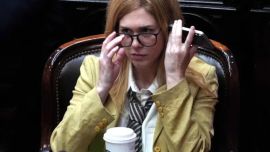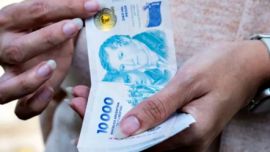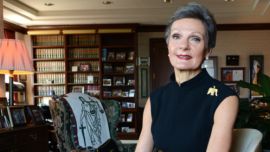In what would be his 18th official quarantine announcement President Alberto Fernández was poised at press time yesterday to renew DISPO (Distanciamiento Social Preventivo y Obligatorio) social distancing measures throughout the month of February, while reaffirming the return of schoolchildren to their classrooms.
According to local reports, the existing decree outlining steps to tackle the spread of Covid-19 – set to expire tomorrow – will be extended with a change that authorises Argentina’s provinces to return to face-to-face classroom teaching.
The new rule will be applied in conjunction with the epidemiological criteria defined last October and complementary to the protocol approved last July, with the level of risk of contagion for teachers as one of the criteria.
The return to classrooms has been at the centre of political debate of late, with the opposition escalating its criticism of the government in recent weeks.
President Fernández is due to hold a virtual meeting with provincial governors later today to evaluate the epidemiological situation regarding coronavirus. Three weeks ago President Fernández was on the brink of ordering a curfew from 11pm to 6am but decided against it, yet at the same time he decreed technical indicators enabling governors to adopt such measures immediately in the event of an abrupt surge of coronavirus contagion.
Complications are arising that may temporarily delay the return of face-to-face classes, however. Buenos Aires City Mayor Horacio Rodríguez Larreta’s plans for a February 17 return to classrooms are being resisted by teacher unions who are nevertheless comfortable with the March 1 date set in Buenos Aires Province.
At press time it remained unclear how the delays in the delivery of the Russian vaccine Sputnik V would impact the announcement of restrictions for February. But in general no major changes from the previous quarantine conditions were expected.
Vaccines arrive
Argentina welcomed a new shipment of Russia’s Sputnik V vaccine on Thursday, with a total of 240,000 doses carried to Buenos Aires from Moscow by an Aerolíneas Argentinas plane.
It was the third shipment of shots to land in Argentina since December, although 20,000 of the doses were shipped off to Bolivia later the same day.
"Today [Thursday] we welcomed our third flight from Russia that brought 240,000 doses of the Sputnik V vaccine to the country, 20,000 of them will be for Bolivia," announced the president of Aerolíneas, Pablo Ceriani, on Twitter.
Argentina began its vaccination campaign against coronavirus with Sputnik V on December 29. It is the only vaccine the government has managed to secure access to so far, though it has deals with other manufacturers in place.
On Wednesday, during an official state visit to Chile, Fernández remarked that "the Russian Sputnik vaccine was the first that Argentina had available, but the country has contracts with AstraZeneca and Oxford."
"We wanted to have a contract with Pfizer, which Pfizer, for other reasons, did not agree to. We are in discussions with Sinopharm in China, with Janssen and with Moderna," the president said.
Argentina is also signed up to the World Health Organisation’s Covax scheme.
With delivery of the third batch of Sputnik vaccines, which are produced by the Russian laboratory Gamaleya with support from the Russian Direct Investment Fund, Argentina has now received 820,000 doses of the 19.4 million it has agreed to purchase from Moscow (it also allows for the possibility of five million more). Delivery is anticipated before the end of February, though that target is looking more and more unlikely by the day.
Health Access Secretary Carla Vizzotti said Wednesday that that the latest shipment contained "220,000 doses, 110,000 of each component," a reference to the two shots that make up Sputnik V.
"We hope to have news soon and to receive more vaccines," Vizzotti said.
Argentina’s national vaccination campaign is voluntary and prioritises healthcare workers, followed by adults over the age of 60.
– TIMES/PERFIL


























Comments